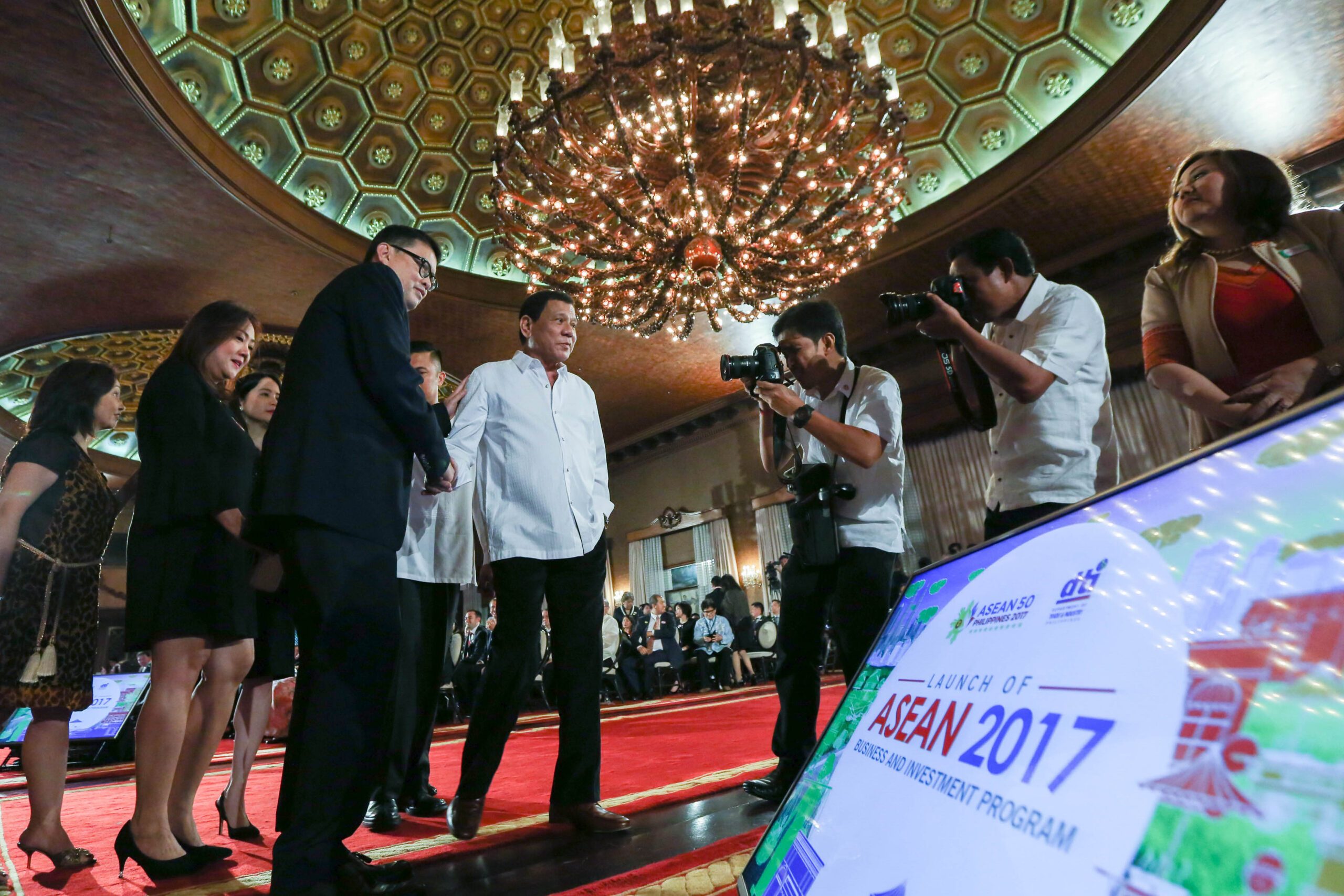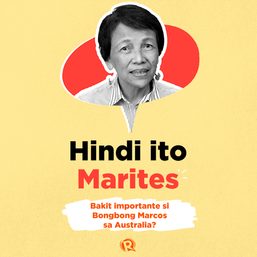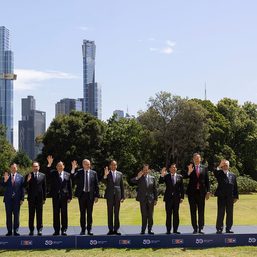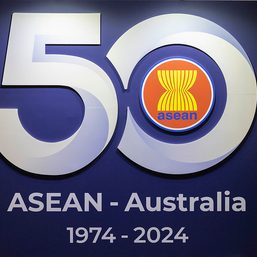SUMMARY
This is AI generated summarization, which may have errors. For context, always refer to the full article.

MANILA, Philippines – After attending two international summits, it will be President Rodrigo Duterte’s turn to host world leaders during major summits of the Association of Southeast Asian Nations this year.
Chief of Presidential Protocol and head of the Association of Southeast Asian Nations (ASEAN) 2017 National Organizing Council Marciano Paynor Jr is “very confident” Duterte is ready to take on the job.
“Very confident, very confident. It’s just the way that he is. He picks up quite fast,” said Paynor during an interview with Rappler on Monday, February 6.
As chairman of ASEAN this year, the Philippines is hosting 119 meetings, including two summits to be participated in by heads of state and heads of government. (READ: Duterte launches ‘people-centric’ ASEAN 2017)
This is the first time Duterte will host an international summit as president.
The biggest of the summits, to be held in November, will be attended by 21 country leaders, including United States President Donald Trump, Chinese Premiere Li Keqiang, and leaders of all ASEAN member countries.
Briefings
Duterte has been preparing for his duties as ASEAN chairman through regular briefings about pressing issues relevant to the ASEAN region.
“He is slowly being taken up to speed by the Department of Foreign Affairs, Department of Trade and Industry, and the Department of Social Welfare,” said Paynor, who participates in the briefings.
“They are part of normal briefings in Cabinet, that’s one. And two, there are special briefings for him, and henceforth, there will be quite a number of these briefings so that, little by little, the President gets to really soak in on the issues that are now being discussed in ASEAN,” he added.
So far, he has had ASEAN-related briefings once every 3 weeks. Soon, the briefings will be held once a week.
He is briefed about issues like the West Philippine Sea dispute, labor, economy, trade, security, and more.
Though faced with long readings on these issues, Duterte is rising up to the challenge.
“It’s in the way he asks questions, from there, from the questions he asks, you know what this guy is looking at and he probably wants to be clarified about certain issues,” said Paynor.
He fondly recalled how the President would sometimes “complain” about the thick pile of reading material.
Chairing a summit
Working in Duterte’s favor is his experience attending two major international summits in his first months as president.
He attended the 2016 ASEAN summits in Laos in September 2016 and the APEC leaders’ summit in Peru in November of that year.
“So he has a full grasp of how it is like to chair. He saw how it is as a participant, now he is going to be the one chairing. That’s a totally different story,” said Paynor.
Paynor, who also led preparations for APEC 2015, said preparations for chairing and hosting events like the ASEAN summits is “more intense.”
Duterte is expected to have a “mastery of subject matter, substantive issues, etcetera,” he said.
As ASEAN chairman, Duterte will have the primary task of ensuring agreements are reached by the regional bloc during the summits.
“The chair’s purpose is to ensure the meeting comes out with something positive, with an outcome, whether it’s an outcome document, an agreement here, a signed treaty there, that’s the chair’s work,” said Paynor.
Duterte and Cabinet secretaries who will chair minister-level meetings will serve as “shepherds” to ensure their meetings and the summit as a whole produces results.
Country representatives will be coming in with their own positions and take on various issues.
Summits and bilateral meetings on the sidelines will be opportunities for Duterte to hear them out and find a way to achieve consensus amid divergent points of view.
No absences, short speeches
Chairing the ASEAN summits will also require the President to follow some rules.
Duterte’s absence from some meetings and activities in ASEAN and APEC summits last year can’t be repeated in ASEAN 2017 where he plays host.
“As chair, he cannot be absent,” said Paynor.
If Duterte is absent for a meeting among heads of government or heads of state, Foreign Secretary Perfecto Yasay Jr would take his place, but it would be a breach in protocol.
“These are all heads of government. You cannot have the Foreign Secretary chairing because, in a sense, he is a minister, he is a level lower. And the heads of government are the ones attending the meeting so it has to be the President,” said Paynor.
Duterte explained he had missed the ASEAN-US Summit in Laos “as a matter of principle,” because he “does not like” Americans. The summit was attended by former US President Barack Obama whom Duterte had lambasted for “lecturing” him on human rights.
Duterte had also skipped the traditional family portrait and some meetings at the APEC summit.
Duterte, fond of giving long speeches rich with anecdotes and cursing, will also have to stick to strict time limits during formal meetings.
In fact, as chair, it will be Duterte himself who will have to impose the 7-minute time limit.
“As chair, sometimes it’s your duty to say and how to say it, that the speaker is going beyond the allotted time. These are some of the things he will need to learn to do,” said Paynor.
Script
ASEAN 2017 organizers will provide Duterte with prepared interventions or speeches and an entire script which Paynor is “confident” the President will follow.
Duterte, in public speeches, has said his visits to ASEAN countries in his first months as president were part of his preparation for his hosting duties this year.
Among the major challenges he faces is ensuring the completion of a draft framework of ASEAN’s South China Sea Code of Conduct with China.
The Code of Conduct is a long-awaited binding agreement between ASEAN members and China on how overlapping claims in the South China Sea (West Philippine Sea) can be managed. – Rappler.com
Add a comment
How does this make you feel?
![[In This Economy] Can the PH become an upper-middle income country within this lifetime?](https://www.rappler.com/tachyon/2024/04/tl-ph-upper-income-country-04052024.jpg?resize=257%2C257&crop=295px%2C0px%2C720px%2C720px)


![[OPINION] Controversy over ASEAN’s ‘Swift’ week](https://www.rappler.com/tachyon/2024/03/tl-asean-swift-week.jpg?resize=257%2C257&crop=357px%2C0px%2C720px%2C720px)

There are no comments yet. Add your comment to start the conversation.